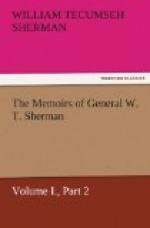Ascending from the consideration of the narrow question of the political and military situation in Kentucky, and the extent of force necessary to redeem the State from rebel thraldom, forecasting in his sagacious intellect the grand and daring operations which, three years afterward, he realized in a campaign, taken in its entirety, without a parallel in modern times, General Sherman expressed the opinion that, to carry the war to the Gulf of Mexico, and destroy all armed opposition to the Goverment, in the entire Mississippi Valley, at least two hundred thousand troops were absolutely requisite.
So soon as General Sherman had concluded the expression of his views, Mr. Cameron asked, with much warmth and apparent irritation, “Where do you suppose, General Sherman, all this force is to come from.” General Sherman replied that he did not know; that it was not his duty to raise, organize, and put the necessary military force into the field; that duty pertained to the War Department. His duty was to organize campaigns and command the troops after they had been put into the field.
At this point of the proceedings, General Sherman suggested that it might be agreeable to the Secretary to hear the views of Mr. Guthrie. Thus appealed to, Mr. Guthrie said he did not consider himself, being a civilian, competent to give an opinion as to the extent of force necessary to parry the war to the Gulf of Mexico; but, being well informed of the condition of things in Kentucky, he indorsed fully General Sherman’s opinion of the force required to drive the rebels out of the State.
The foregoing is a circumstantial account of the deliberations of the council that were of any importance.
A good deal of desultory conversation followed, on immaterial matters; and some orders were issued by telegraph, by the Secretary of War, for some small reenforcements to be sent to Kentucky immediately, from Pennsylvania and Indiana.
A short time after the council was held—the exact time is not now remembered by the writer—an imperfect narrative of it appeared in the New York Tribune. This account announced to the public the conclusions uttered by General Sherman in the council, without giving the reasons on which his conclusions were based. The unfairness of this course to General Sherman needs no comment. All military men were shocked by the gross breach of faith which had been committed
Th. J. Wood, Major-General Volunteers
Vicksburg, Mississippi, August 24, 1886.
Brigadier-General Don Carlos Buell arrived at Louisville about the middle of November, with orders to relieve me, and I was transferred for duty to the Department of the Missouri, and ordered to report in person to Major-General H. W. Halleck at St. Louis. I accompanied General Buell to the camp at Nolin, where he reviewed and inspected the camp and troops under the command of General A. McD. McCook, and on our way back General Buell inspected the regiment of Hazzard at Elizabethtown. I then turned over my command to him, and took my departure for St. Louis.




